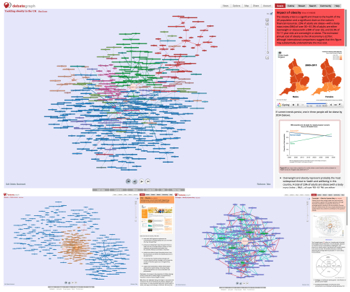Tackling obesity in the UK
With concern growing that the Foresight analysis—that 50% of the UK population could be obese by 2050, at an annual cost to the nation of around £50 billion per year [2]—substantially underestimates the scale of the unfolding obesity crisis, the College of Contemporary Health is working with the wider policy community to develop a whole systems map of the obesity crisis and the potential responses.
Short Link: debategraph.org/obesity Register/log-in
Outline view ›› Document view ›› Radial view ›› Add a Comment or Link ››
In introducing their excellent recent analysis [7] of the obesity challenge in the UK and beyond, the McKinsey Global Insight authors noted:
...our analysis is by no means complete. Rather, we see our work on a potential program to address obesity as the equivalent of the maps used by 16th-century navigators. Some islands were missing and some continents misshapen in these maps, but they were still helpful to the sailors of that era. We are sure that we have missed some interventions and over- or underestimated the impact of others. But we hope that our work will be a useful guide and a starting point for efforts in the years to come, as we and others develop this analysis and gradually compile a more comprehensive evidence base on this topic.
Similarly, the authors of the 2007 Foresight Report [2] engaged in extensive systems mapping work to develop a qualitative, causal loop model to:
- help us understand the complex systemic structure of obesity
- contribute to developing a tool that helps policy makers respond to obesity in the generation, definition and testing of possible policy options.
The obesity mapping project initiated here by The College of Contemporary Health [8] is grounded the same spirit and intent. It aims to create a comprehensive and coherent visual representation of the obesity governance space – including the causes, impacts, policy actors, proposed interventions, evidence, guidance, and barriers to change – that can help each stakeholder explore and understand the space as a systemic whole; that can be collaboratively and iteratively edited, refined, and evaluated by the policy community; and that provides a dynamic, open substrate for dialogue, learning and action across the policy community.

Obesity Mapping Project initiated by The College of Contemporary Health
